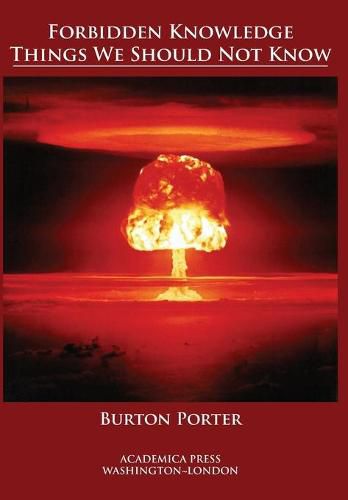Readings Newsletter
Become a Readings Member to make your shopping experience even easier.
Sign in or sign up for free!
You’re not far away from qualifying for FREE standard shipping within Australia
You’ve qualified for FREE standard shipping within Australia
The cart is loading…






This title is printed to order. This book may have been self-published. If so, we cannot guarantee the quality of the content. In the main most books will have gone through the editing process however some may not. We therefore suggest that you be aware of this before ordering this book. If in doubt check either the author or publisher’s details as we are unable to accept any returns unless they are faulty. Please contact us if you have any questions.
In this book eminent philosopher Burton Porter examines the concept of forbidden knowledge in religion, science, government, and psychology. From the tree of knowledge in the Garden of Eden (forbidden fruit), to world altering scientific research (nuclear power, stem-cells, cloning) to damning government secrets (Abu Ghraib, domestic spying), to traumatic experiences that individuals want to repress (sexual abuse), humanity has encountered knowledge that has been hidden and suppressed. We experience this denial as a loss of control and respect, and we want to know exactly what knowledge has been prohibited and why we cannot have access to it. Forbidden knowledge, therefore, is of enormous interest to the general public.
The basic question, then, is: when, if ever, should knowledge be forbidden? Are there sacred realms that human beings are not meant to explore? Can scientific research be a Frankenstein monster, which will harm us one day? When are government secrets necessary for national security, and when does the public have a right to know? Is too much information classified? When do databanks, eavesdropping, and surveillance invade our privacy? Is self-deception justified if the truth would be psychologically disturbing? In short, can we know more than is good for us?
The author takes the general position that too much material is prohibited, especially today, even while business and government invade individual privacy more and more. A primary assumption in a democracy is that we can have confidence in the people, so information should not be forbidden unless there is a vital and compelling reason to withhold it.
$9.00 standard shipping within Australia
FREE standard shipping within Australia for orders over $100.00
Express & International shipping calculated at checkout
This title is printed to order. This book may have been self-published. If so, we cannot guarantee the quality of the content. In the main most books will have gone through the editing process however some may not. We therefore suggest that you be aware of this before ordering this book. If in doubt check either the author or publisher’s details as we are unable to accept any returns unless they are faulty. Please contact us if you have any questions.
In this book eminent philosopher Burton Porter examines the concept of forbidden knowledge in religion, science, government, and psychology. From the tree of knowledge in the Garden of Eden (forbidden fruit), to world altering scientific research (nuclear power, stem-cells, cloning) to damning government secrets (Abu Ghraib, domestic spying), to traumatic experiences that individuals want to repress (sexual abuse), humanity has encountered knowledge that has been hidden and suppressed. We experience this denial as a loss of control and respect, and we want to know exactly what knowledge has been prohibited and why we cannot have access to it. Forbidden knowledge, therefore, is of enormous interest to the general public.
The basic question, then, is: when, if ever, should knowledge be forbidden? Are there sacred realms that human beings are not meant to explore? Can scientific research be a Frankenstein monster, which will harm us one day? When are government secrets necessary for national security, and when does the public have a right to know? Is too much information classified? When do databanks, eavesdropping, and surveillance invade our privacy? Is self-deception justified if the truth would be psychologically disturbing? In short, can we know more than is good for us?
The author takes the general position that too much material is prohibited, especially today, even while business and government invade individual privacy more and more. A primary assumption in a democracy is that we can have confidence in the people, so information should not be forbidden unless there is a vital and compelling reason to withhold it.